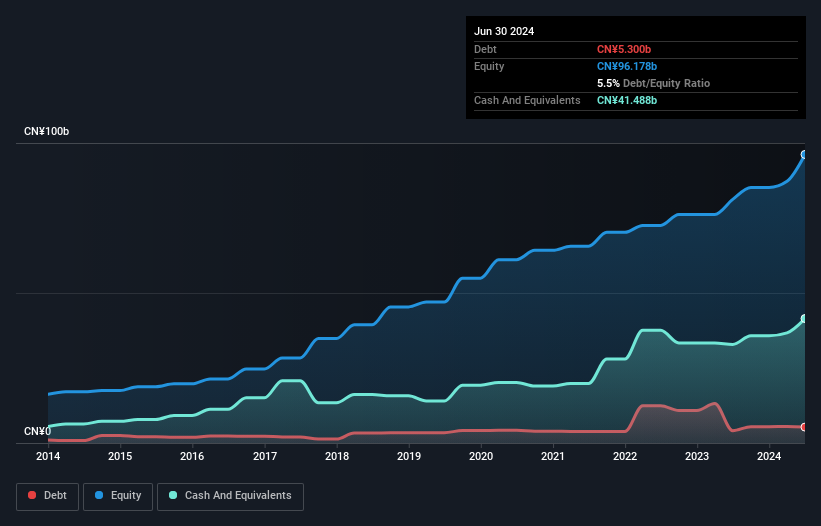Geely Automobile Holdings (HKG:175) Could Easily Take On More Debt
David Iben put it well when he said, 'Volatility is not a risk we care about. What we care about is avoiding the permanent loss of capital.' So it seems the smart money knows that debt - which is usually involved in bankruptcies - is a very important factor, when you assess how risky a company is. Importantly, Geely Automobile Holdings Limited (HKG:175) does carry debt. But the real question is whether this debt is making the company risky.
When Is Debt Dangerous?
Debt is a tool to help businesses grow, but if a business is incapable of paying off its lenders, then it exists at their mercy. In the worst case scenario, a company can go bankrupt if it cannot pay its creditors. However, a more frequent (but still costly) occurrence is where a company must issue shares at bargain-basement prices, permanently diluting shareholders, just to shore up its balance sheet. Of course, plenty of companies use debt to fund growth, without any negative consequences. The first step when considering a company's debt levels is to consider its cash and debt together.
View our latest analysis for Geely Automobile Holdings
How Much Debt Does Geely Automobile Holdings Carry?
You can click the graphic below for the historical numbers, but it shows that as of June 2024 Geely Automobile Holdings had CN¥5.30b of debt, an increase on CN¥4.10b, over one year. But it also has CN¥41.5b in cash to offset that, meaning it has CN¥36.2b net cash.

How Strong Is Geely Automobile Holdings' Balance Sheet?
According to the last reported balance sheet, Geely Automobile Holdings had liabilities of CN¥90.2b due within 12 months, and liabilities of CN¥10.7b due beyond 12 months. Offsetting this, it had CN¥41.5b in cash and CN¥35.8b in receivables that were due within 12 months. So it has liabilities totalling CN¥23.6b more than its cash and near-term receivables, combined.
Geely Automobile Holdings has a very large market capitalization of CN¥117.2b, so it could very likely raise cash to ameliorate its balance sheet, if the need arose. However, it is still worthwhile taking a close look at its ability to pay off debt. While it does have liabilities worth noting, Geely Automobile Holdings also has more cash than debt, so we're pretty confident it can manage its debt safely.
Better yet, Geely Automobile Holdings grew its EBIT by 115% last year, which is an impressive improvement. If maintained that growth will make the debt even more manageable in the years ahead. The balance sheet is clearly the area to focus on when you are analysing debt. But it is future earnings, more than anything, that will determine Geely Automobile Holdings's ability to maintain a healthy balance sheet going forward. So if you're focused on the future you can check out this free report showing analyst profit forecasts.
But our final consideration is also important, because a company cannot pay debt with paper profits; it needs cold hard cash. While Geely Automobile Holdings has net cash on its balance sheet, it's still worth taking a look at its ability to convert earnings before interest and tax (EBIT) to free cash flow, to help us understand how quickly it is building (or eroding) that cash balance. Happily for any shareholders, Geely Automobile Holdings actually produced more free cash flow than EBIT over the last three years. There's nothing better than incoming cash when it comes to staying in your lenders' good graces.
Summing Up
While Geely Automobile Holdings does have more liabilities than liquid assets, it also has net cash of CN¥36.2b. And it impressed us with free cash flow of CN¥11b, being 541% of its EBIT. So we don't think Geely Automobile Holdings's use of debt is risky. There's no doubt that we learn most about debt from the balance sheet. But ultimately, every company can contain risks that exist outside of the balance sheet. For example, we've discovered 2 warning signs for Geely Automobile Holdings (1 is a bit concerning!) that you should be aware of before investing here.
When all is said and done, sometimes its easier to focus on companies that don't even need debt. Readers can access a list of growth stocks with zero net debt 100% free, right now.
Have feedback on this article? Concerned about the content? Get in touch with us directly. Alternatively, email editorial-team (at) simplywallst.com.
This article by Simply Wall St is general in nature. We provide commentary based on historical data and analyst forecasts only using an unbiased methodology and our articles are not intended to be financial advice. It does not constitute a recommendation to buy or sell any stock, and does not take account of your objectives, or your financial situation. We aim to bring you long-term focused analysis driven by fundamental data. Note that our analysis may not factor in the latest price-sensitive company announcements or qualitative material. Simply Wall St has no position in any stocks mentioned.
 Index Options
Index Options CME Group
CME Group Nasdaq
Nasdaq Cboe
Cboe TradingView
TradingView Wall Street Journal
Wall Street Journal